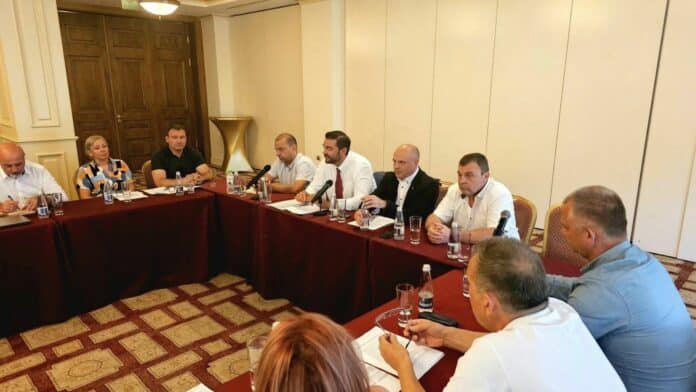
An important stakeholder meeting on black abalone and regulatory mechanisms in the Bulgarian Black Sea area was held in Burgas. Organized by the Executive Agency for Fisheries and Aquaculture /IARA/, the event brought together representatives of the Bulgarian Food Safety Agency /FSA/, the Regional Directorate „Border Police“-Burgas, the Basin Directorate „Black Sea Region“, fishermen associations, mussel farm owners and other stakeholders. Representatives of the media and citizens were not invited to the meeting, which raised suspicions of serving vested interests or concealing important information from the public.
Before the meeting Nikolay Georgiev, owner of a mussel farm in Nessebar, told Iskra.bg about the problems faced by the industry:
“The idea, which we launched at the beginning of the season itself before the Food Agency and IARA, is to stop the vicious practice of selling poached mussels on the market and in large retail outlets. This mussel is harvested from habitats that are not controlled by any institution. The mussel farms are controlled by the Basin Authority on a monitoring basis and we monitor 23 water indicators.”
Georgiev pointed to two main aspects of the mussel poaching problem. First, the IAPA continues to issue documents for the harvesting of abalone by divers without proper permits, which is in violation of European Regulation 853, which requires zoning of harvesting sites:
“Under this regulation there must be three zones. Zone A is where the habitats are controlled and everything that is produced must be controlled for Escherichia coli and Salmonella. Zone C has a criterion for the presence of Escherichia coli, but when the mussel is acquired from Zone C, it is mandatory to go through a treatment centre.”
During the meeting, it was made clear that there is a lack of necessary cooperation between BFSA and IARA in sharing information and documents when violations are detected, such as how much mussel is caught and how much has gone through treatment plants before reaching the end user. Nikolay Georgiev pointed out:
“Traders take a document from mussel farms for 100 kg of mussels purchased, then buy poached mussels, mix them and put them on the market. Two institutions should put an end to this vicious practice – IARA and ODBH-Burgas.”
Commissioner Lachezar Momchev, director of the Regional Directorate of Border Police in Burgas, stressed the need for joint efforts between the institutions:
“We are not competent enough for the certificates issued by IARA and we don’t know if the documents provided by the inspected persons are genuine. We have plans to cooperate with other institutions. Joint teams are an effective solution to tackle this problem.”
Representatives of BABH and IARA stressed that they work in the interests of consumers, not businesses. The Director of ODBH-Burgas Dr Dimitar Germanov said:
“If the primary sale could be controlled, then we would not be at this meeting. The control should be done from the quay, but we do not get information from IARA. Almost everyone we have checked has documents. We are not running away from responsibility. Hold the primary sale accountable – how much was caught in a day and who it was sold to after that.”
An important clarification was made on the need for the National Revenue Agency / NRA / to also participate in the checks along with other institutions, as there is no link between what is taken from poachers and what is regulated on the market.
The meeting also discussed the legislative framework for bivalve molluscs, including prohibitions, restrictions and regimes in the catching areas, necessary requirements for the issuance of permits for commercial fishing of marine black abalone. Traceability of catches, labelling, transport conditions, permitting regimes and potential legislative changes to prevent negative impacts on human health were addressed.
The joint interaction between all institutions in establishing possible restrictive regimes for catch bans in sensitive Black Sea areas with identified potential risks of sewage discharge or presence of chemical plants in the vicinity was also discussed. Dr Nikolay Georgiev concluded:
“Thank you for the participation of all institutions at the forum. An example of successful cooperation is the action between the Agency, the Border Police and the BBAH, conducted a few days ago in Varna for offenders with over 4 tonnes of crayfish. Today we discussed control activities to be undertaken in joint and regular inspections, in accordance with the plans for interaction between the institutions. In the coming months we will carry out increased inspections of black abalone during the summer season.”
The meeting highlighted the importance of coordinated action between all institutions to prevent poaching and ensure the safety of black abalone on the market.
Civil indignation in Burgas: The whole city is under siege, but no one dares to protest!
















[…] Vicious practice of selling poached black abalone uncovered […]
[…] Vicious practice of selling poached black abalone uncovered […]